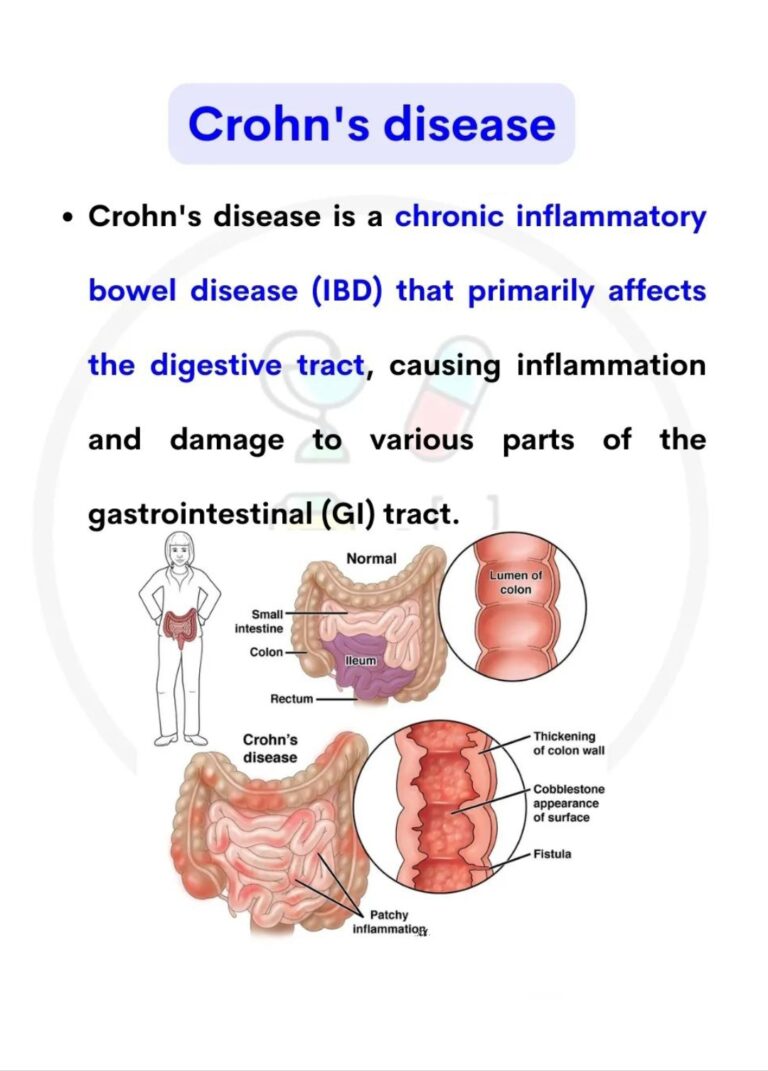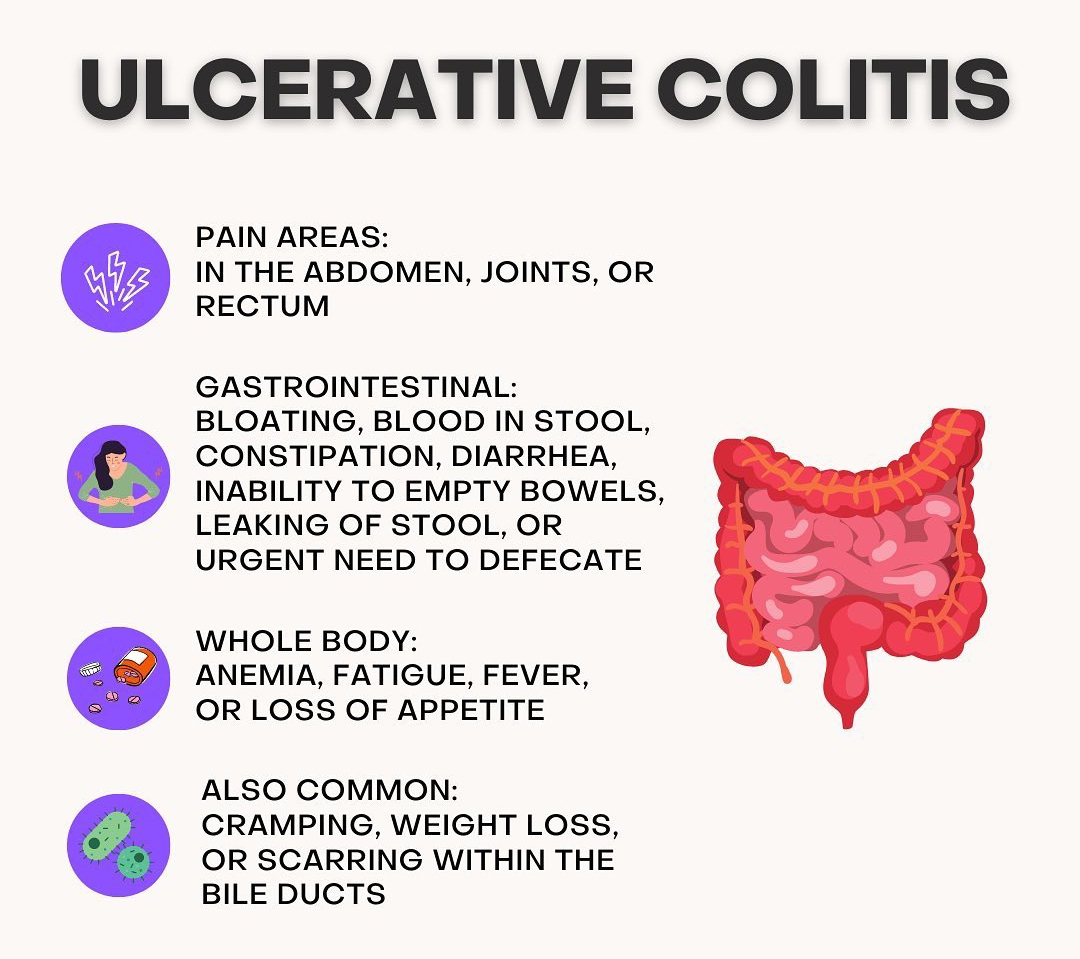Table of Contents
A Review
A portion of your digestive system may become swollen or inflamed if you have Crohn’s disease. Although it can affect any region of your digestive system it usually affects the colon and small intestine (large intestine).
IBD or inflammatory bowel disease is a group of diseases that includes Crohn’s disease and ulcerative colitis (UC).
Symptoms of Crohn’s disease can be unpleasant diarrhea and cramping in the stomach or discomfort in the abdomen are the most typical ones.
There is no cure for this illness it is permanent. Crohn’s disease has no known cure although medication can lessen symptoms and enable you to lead an active fulfilling life.
Symptoms
Abdominal Pain and Cramping: Often affects the abdomen’s lower right side. Pain can vary in intensity from mild to severe and can be intermittent or chronic.
Diarrhea: Stools that are loose, watery or frequent are typical. Blood or mucous may occasionally accompany diarrhea.
Weight Loss: Due to decreased appetite malabsorption of nutrients or both.
Nausea and Vomiting: particularly in cases where the intestines are blocked or have considerable inflammation.
Fever: It is possible to have a low grade fever particularly during flare ups.
Fatigue : Chronic fatigue or low energy is a typical occurrence frequently brought on by malnourishment or the bodys continuing inflammatory reaction.
Anorexia: Appetite loss or abrupt feelings of fullness.
Joint Pain: Joint discomfort and edema can result from inflammation.
Skin Issues:It is possible to develop ailments like pyoderma gangrenosum (painful ulcers) or erythema nodosum (painful red nodules beneath the skin).
Eye Inflammation: There may be symptoms such as conjunctivitis (pink eye) or uveitis (eye inflammation).
Mouth Sores: Aphthous stomatitis or painful mouth ulcers or sores can occur.
Anemia: Due to iron malabsorption or chronic blood loss, which causes weakness, exhaustion and pale skin.
Bone Health Issues: Vitamin D and calcium deficits can lead to the development of osteoporosis and osteopenia.
Anal Fissures: Pain can arise from small tears in the anus lining particularly during and after bowel motions.
Hemorrhoids: Retinal vein enlargements can result in pain and hemorrhage.
Depression and Anxiety:Depression and anxiety are two mental health conditions that can be brought on by a chronic illness and its persistent symptoms.
Types
1. Ileocolitis
Impacts both the colon (the large intestine) and the ileum, which is the final segment of the small intestine.
Symptoms include weight loss, diarrhea, abdominal pain, and even rectal bleeding. Additionally, it may result in colon symptoms like cramps and frequent bowel motions.
2. Ileitis
Mostly affects the ileum the small intestine’s last segment.Like ileocolitis except confined to the ileum. Weight loss, diarrhea and stomach pain are a few examples of this. Nutrient malabsorption problems may arise as a result of inflammation.
3. Colitis
Mostly affects the ileum the small intestine’s last segment.Like ileocolitis except confined to the ileum. Weight loss, diarrhea and stomach pain are a few examples of this. Nutrient malabsorption problems may arise as a result of inflammation.
4. Jejunoileitis
Affects the major portions of the small intestine the jejunum and the ileum.Symptoms: Causes weight loss diarrhea and stomach ache. Nutritional malabsorption may also be an issue when the jejunum is involved.
5. Gastroduodenal Crohns disease
Affects both the stomach and the duodenum which is the first part of the small intestine.
Abdominal pain, nausea and vomiting are the symptoms. Sometimes obstructions in the upper gastrointestinal system can result from this kind.
6. Perianal Crohn’s Disease
Impacts the region encompassing the rectum and anus.
Anal fissures, abscesses, fistulas and skin tags are among the painful symptoms. It may result in severe discomfort and make managing Crohn’s disease more difficult.
7. Diffuse Crohn’s Disease
Affects several digestive system regions at once.Symptoms: Depending on the precise locations afflicted a combination of symptoms from the different categories. The extensive breadth of the inflammation makes this kind more difficult to treat.
8. Crohn’s Colitis
A word that is frequently used to characterize Crohn’s disease which mostly affects the colon.
Symptoms: Rectal bleeding, diarrhea and abdominal pain are similar to those of colitis.
9. Crohn’s disease with fistulas
This condition can affect any part of the digestive system although it usually affects the region where inflammation is the worst.
Symptoms: The existence of fistulas may result in extra symptoms like discomfort, recurring infections and persistent discharge from anomalous passageways.
What causes Crohn’s disease?
Although a single cause for Crohn’s disease is unknown, a malfunctioning immune response is thought to be involved.
When pathogens enter your body, your immune system typically goes into assault mode to eliminate them. An indication that your body is combating the infection is inflammation. Your immune system settles down and the inflammation goes away as soon as the threat is eliminated.
When your immune system goes into overdrive and starts attacking your body’s own cells, it might result in an autoimmune response. For instance, your immune system might unnecessarily target bacteria that are typically present in your stomach, leading to intestinal inflammation associated with Crohn’s disease.
At times, Crohn’s disease runs in families. There is a chance that the cause of your body’s immune system attacking healthy cells is inherited.
How is Crohn’s disease diagnosed?
The majority of individuals with Crohn’s disease initially consult a doctor due to persistent diarrhea, abdominal pain or inexplicable weight loss. You might need to see a gastroenterologist a physician who specializes in digestive disorders as part of your workup.
Your family history and medical history including any symptoms will be taken into account by your physician. To check for physical symptoms of Crohns disease such as abdominal pain or swelling they will examine you. Before determining a diagnosis they could do a number of tests to rule out other illnesses.
Laboratory examinations
Lab tests look for tiny illness indicators in a sample of tissue or fluid.
A blood test counts your blood cells and examines your blood chemistry to check for signs of Crohn’s disease. An infection or inflammation may be indicated by a high white blood cell count.Anemia which is often associated with this disease is indicated by low red blood cell counts. If there is active inflammation your liver produces a substance called C-reactive protein (CRP) which may be increased.
Stool test: This examination looks for germs or parasites in a sample of stool or poop. It can eliminate diseases that lead to persistent diarrhea. For instance a fecal test for calprotectin quantifies intestinal inflammation.
Imaging techniques
Your doctor might prescribe imaging tests to get images of your digestive system, like:
Computed tomography (CT) scan: A CT scan uses X-rays to produce images of your digestive system.It indicates to your doctor how bad the inflammation is.
Magnetic resonance imaging (MRI):An MRI produces images of your interior organs by using radio waves and a large magnet. It is particularly helpful in displaying fistulas surrounding the anus and small intestine. Before the operation you might need to consume a specific contrast fluid to make the images more clear (MRI enterography).
Endoscopy
During an endoscopy, a narrow tube called an endoscope equipped with a light and camera is inserted into your digestive tract to capture pictures or films of inflammatory areas. During these operations, you will be anesthetized.
Colonoscopy: An endoscope is used by the medical professional to see inside your colon and lower small bowel (ileum) during this procedure. A biopsy sample of tissue may be taken in order to check for white blood cells.
Upper endoscopy: A physician uses your mouth to introduce an endoscope into your throat. Through a linked camera, your doctor can see inside all the way from your mouth to the start of your small intestine.
A little plastic capsule with a light and a camera is swallowed during a capsule endoscopy in order to take pictures of your digestive system as it passes through.

Treatments and Management
It is discussed below
How does one treat Crohn’s disease?
There is no treatment for Crohn’s disease at present. Numerous therapy exist, but none of them are universally effective.
Your medical professional will collaborate with you to determine the best course of action so that managing Crohn’s disease becomes easier.
Medications
Medication that lowers inflammation and modulates your immune system is part of the treatment for Crohn’s disease. Research indicates that addressing inflammation is probably going to help Crohn’s disease patients in the long run. Treatments for particular symptoms, such as discomfort and diarrhea could also be necessary.
Steroids: Budesonide and corticosteroids reduce inflammation temporarily but they are rarely suitable for managing symptoms over the long run.
Anti-inflammatory drugs: Anti inflammatory medications called 5-aminosalicylates most commonly used to cure ulcerative colitis. They help those with Crohn’s disease to a limited extent.
Immunomodulators: They alter the way your immune system functions. Immunosuppressive types reduce the strength of your immune response. Methotrexate and azathioprine are two examples.
Biologics: Biologics work by targeting the proteins that lead to an overly heightened immune response in your body. Many different types of biologics are administered by injection or IV. TNF inhibitors, integrin inhibitors, Il-12/23 inhibitors and Il-23 inhibitors are among the available options.
Advanced small molecule therapies : JAK inhibitors are pills that treat Crohn’s disease and lower the immune response.
Antibiotics:Antibiotics are used to treat Crohn’s disease problems. Fistulas or abscesses may result from severe infections.
Antidiarrhea drugs: Prescription drugs such as loperamide can be used to treat severe diarrhea.
Pain: Many medications are available to relieve discomfort associated with Crohn’s disease.
Every medication has perks and drawbacks.Together you and your doctor will select the drugs that will most likely benefit you. They will check in with you again to make sure your drugs are taking as prescribed.
Get in touch with your doctor if your medication isn’t working or is causing unpleasant side effects.
Nutrition
Adopting a healthy diet can help you feel better and occasionally even temporarily cure certain diseases. You might need to get formula through a feeding tube (enteral nutrition) if you’re not getting enough nutrients. Your healthcare professional may frequently make specific suggestions and do tests to make sure your nutritional needs are being fulfilled depending on the severity of your illness.
Crohn Disease Surgery
Crohn’s disease complications can be treated surgically. Intestinal perforations, fistulas, strictures and obstructions may require surgery to be removed.
FAQs
What is Crohn’s Disease?
Definition: Crohn’s disease is a type of inflammatory bowel illness that causes the digestive tract to remain inflamed over time. Different layers of the intestinal wall may be affected by inflammation at any point during the digesting process.
Symptoms: Usually present with decreased appetite, fatigue, bloody diarrhea and stomach pain. Possible further symptoms include joint pain, eye irritation and skin rashes.
Causes: Immune system, environmental and genetic factors are believed to play a role in the development of Crohn’s disease while the exact cause of the condition is unknown. The immune system mistakenly attacks healthy tissue in the digestive tract.
Diagnosing: A medical history, physical examination, laboratory testing, endoscopy, CT and MRI scans as well as a biopsy are frequently employed in the diagnosing process.
How Serious is Crohn’s Disease?
Chronic Nature: Crohn’s disease has remissions and flare ups throughout its lifetime. There isn’t a cure however therapy can improve quality of life and reduce symptoms.
Consequences: These could include intestinal obstructions, malnutrition, abscesses and fistulas abnormal connections between organs. In severe cases surgery may be required to remove the damaged sections of the colon.
Impact on Life: The severity and consequences of Crohn’s disease vary greatly. Some people may have mild symptoms while others may have severe symptoms that are incapacitating. The sickness could affect daily activities, work and overall quality of life.
Treatment options include dietary changes, immunosuppressants, biologics and anti-inflammatory drugs as well as occasionally surgery. Maintaining a healthy lifestyle and managing stress are also essential.
Is Crohn’s Disease hereditary?
Crohn’s disease has a hereditary component. Although it can happen to anyone without a family history, those who have a history of the disease are more likely to have it.
Can diet affect Crohn’s Disease?
While eating is not the cause of Crohn’s disease certain foods might exacerbate flare ups or exacerbate symptoms. To identify and manage food triggers dietitians and patients often work together.
Is Crohn’s Disease fatal?
Having Crohn’s disease is not a contagious illness. Being an autoimmune condition it cannot be communicated by contact with people or by being in the environment.
How is Crohn’s Disease managed?
Typically care involves a combination of medicine, lifestyle changes, close observation and sometimes surgery. The goals are to lessen inflammation manage symptoms and prevent negative outcomes.
Can people with Crohn’s Disease lead a normal life?
Many Crohn’s disease patients have busy fulfilling lives when their condition is well managed. Treatment and lifestyle changes can help improve quality of life and lessen symptoms
For fitness click here

Ankush Kumar is a professional content writer and the founder of Healthnick.com. He is a health and wellness enthusiast with a deep interest in nutrition, fitness and holistic living. Harish is committed to delivering research-based insights on various health topics. He enjoys exploring new trends in health, experimenting with nutritious recipes, and staying active.






